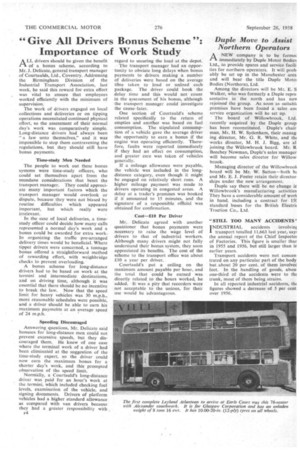"Give All Drivers Bonus Scheme": Importance of Work Study
Page 118

If you've noticed an error in this article please click here to report it so we can fix it.
ALL drivers should be given the benefit of a bonus scheme, according to Mr. J. Delicate, general transport manager of Courtaulds, Ltd., Coventry. Addressing the Birmingham Division of the Industrial Transport Association, last week, he said this reward for extra effort was vital to ensure that employees worked efficiently with the minimum of supervision.
The work of drivers engaged on local collections and deliveries or on tipping operations necessitated continued physical effort, so the assessment of their normal day's work was comparatively simple. Long-distance drivers had always been "a law unto themselves," and it was impossible to stop them contravening the regulations, but they should still have bonus payments.
Time-study Men Needed The people to work out these bonus systems were time-study officers, who could set themselves apart from the mundane considerations that beset the transport manager. They could appreciate many important factors which the transport manager would overlook or dispute, because they were not biased by routine difficulties which appeared important, but which really were irrelevant. • In the case of local deliveries, a timestudy officer could decide how many calls represented a normal day's work and a bonus could be awarded for extra work. In organizing the traffic pre-arranged delivery times would be beneficial. Where tipper drivers were concerned, a tonnage bonus offered a straightforward method of rewarding effort, with weighbridge checks to prevent overloading.
A bonus scheme for long-distance drivers had to be based on work at the termini and intermediate destinations, and on driving time, although it was essential that there should be no incentive to break the law. Now that the speed limit for heavy vehicles was 30 m.p.h., more reasonable schedules were possible, and a driver should be able to earn his maximum payments at an average speed of 24 m.p.h.
Speeding Discouraged Answering questions, Mr. Delicate said bonuses for long-distance men could not prevent excessive speeds, but they discouraged them. He knew of one case where the terminal work of a driver had been eliminated at the suggestion of the time-study expert, so the driver could now earn the maximum bonus for a shorter day's work, and this prompted observation of the speed limit.
NormUy, a Courtauld's long-distance driver was paid for an hour's work at the termini, which included checking fuel levels, examination of the vehicle, and signing documents. Drivers of platform vehicles had a higher standard allowance as compared with van drivers because they had a greater responsibility with F4
regard to securing the load at the depot.
The transport manager had an opportunity to obviate long delays when bonus payments to drivers making a number of deliveries were based on the average Mile taken to load or unload each package. The driver could book the delay time and this would not count in the assessment of his bonus, although the transport manager could investigate the cause later.
One section of Courtauld's scheme related specifically to the return of empties and another was based on fuel consumption. The stipulated consumption of a vehicle gave the ayerage driver the opportunity to earn a bonus if the engine was operating efficiently. Therefore, faults were reported immediately if they had an effect on consumption, and greater care was taken of vehicles generally.
If a mileage allowance were payable, the vehicle was included in the longdistance category, even though it might be engaged on relatively short runs. A higher mileage payment was made to drivers operating in congested areas. A delay at a trader's premises was booked if it amounted to 15 minutes, and the signature of a responsible official was obtained for confirmation.
Cost—HO Per Driver Mr. Delicate agreed with another questioner that -bonus payments were necessary to raise the wage level of drivers to that of industrial workers. Although many drivers might not fully understand their bonus system, they soon appreciated its benefits. The cost of the scheme to the transport office was about flO a year per driver.
Courtauld's put a ceiling on the maximum amount payable per hour, and the total that could be earned was directly related to the hours worked, he added. It was a pity that recorders were not acceptable to the unions, for their use would be advantageous.












































































































































































































































































































































